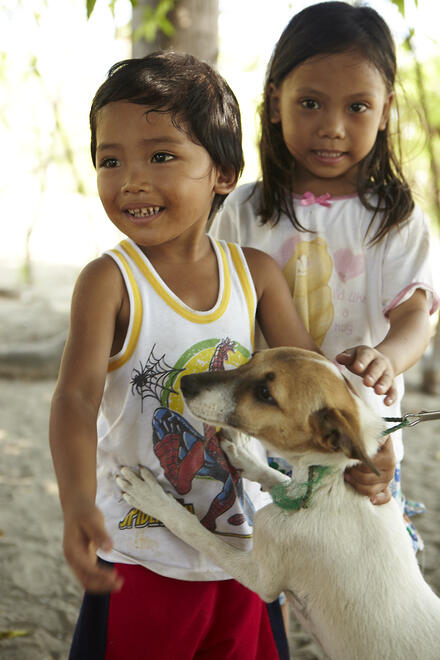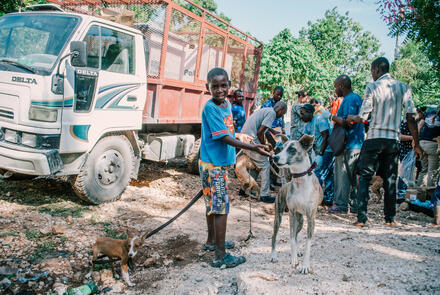First community health workers for dogs to be trained as part of new initiative to eliminate rabies
The Communities Against Rabies campaign will train local health workers, certify and support rabies centers of excellence, and build partnerships for like-minded organizations.

A new initiative that will train and equip the first dog-health focused workforce for rabies control as part of a global grassroots approach to ending the disease in endemic areas was launched today.
Communities Against Rabies is the world’s first program to connect community level actions for rabies elimination, which, until now, was the “missing link” of rabies control efforts. The campaign will launch with an initial focus on three target countries, including Nepal, South Africa, and Sri Lanka.
An estimated 59,000 people die from rabies infections every year, with more than 95 per cent of deaths occurring in Africa and Asia, and overwhelmingly in poor, rural areas – despite effective vaccines for dogs having been on the market for decades. However, these vaccines often do not reach communities that are threatened by rabies.
In response, Communities Against Rabies will empower individuals, civil society, and communities to sustainably control rabies in coordination with local governments through One Health and proven best practices, while delivering rabies solutions that are typically out-of-reach for rabies-affected areas of the world.
"While there has been significant progress in recent years, a lack of coordination, reliable data, and investment has prevented the ‘last mile’ of rabies elimination, particularly at the local level.
The Communities Against Rabies initiative addresses these historic shortcomings by pioneering a new global grassroots movement, equipping rabies-affected communities with the coordination, expertise, and tools needed to achieve rabies elimination.”
Prof. Louis Nel, Executive Director of the Global Alliance for Rabies Control (GARC)
In particular, the new campaign will recognize and train Dog Health Champions (DHCs) in rabies-affected communities to become the first dog-health focused workforce for rabies elimination. DHCs will be trained to educate their communities on dog health and welfare, rabies vaccination, and surveillance.
The initiative will also certify Rabies Centers of Excellence (RCEs) around the world, which will benefit from additional and targeted capacity building, resources, and stimulus financial support for rabies elimination efforts.

Individual centers within a geographic area will be connected to partner and collaborate with other like-minded organizations through the Partners for Community Dog Health (PCDH) program to ensure effective resource-sharing and coordinated rabies elimination efforts.
Communities Against Rabies allows for a coordinated approach that unites NGOs and the public and private sectors, generating much needed momentum in achieving rabies elimination, while also capable of being applied to address other relevant diseases or challenges affecting dogs in a community.
The initiative will not only operationalize the Global Strategic Plan for rabies elimination but will help drive global efforts toward achieving the UN’s Sustainable Development Goals (SDGs), particularly, SDG 3.3, which involves reducing the burden of Neglected Tropical Diseases (NTDs) including rabies.
Coordinated by the Global Alliance for Rabies Control (GARC), the leading NGO dedicated to global rabies elimination through a One Health approach, the program is also supported by Battersea Dogs and Cats Home and Boehringer Ingelheim.
“Rabies is a neglected tropical disease that affects some of the most marginalized and vulnerable communities in the world. Animals and people continue to fall victim to the disease even though the solutions are available and proven.
Battersea is proud to support this new project, which will empower individuals, civil society and communities to control rabies through effective best practices and highlight that by approaching rabies elimination in a collaborative manner, we can create better lives for people and animals globally.”
Simona Zito, Battersea Grants and Programmes Manager.
The initiative will also ensure partners are equipped with the full range of existing innovations and technologies needed to deliver effective rabies control in their communities.
This includes the smartphone-based mHealth tools that help target strategic dog vaccination campaigns to focus on at-risk communities, as well as other modular “One Health” tools provided free of charge by GARC, including trackers for rabies cases, bites, and post-exposure vaccines, among others.
“Nearly three million people are saved yearly from rabies thanks to preventative measures, yet canine rabies vaccines are still not reaching many of the communities where the disease persists.
This new initiative will help ensure that the full range of existing tools and technologies to combat rabies are reaching the hands of communities that need them the most, helping them to better combat and eliminate the disease on a global scale.”
Dr. Jerlyn Sponseller, Boehringer Ingelheim’s STOP Rabies Technical Manager.
You can learn more about the Communities Against Rabies Initiative by visiting the End Rabies Now website here.
The Communities Against Rabies initiative is supported by Battersea Dogs and Cats Home.